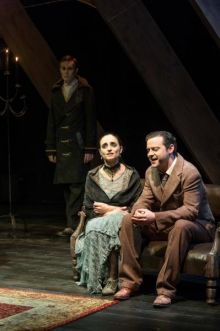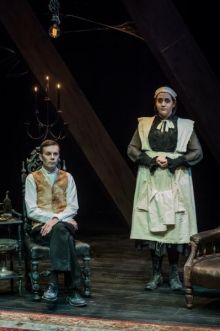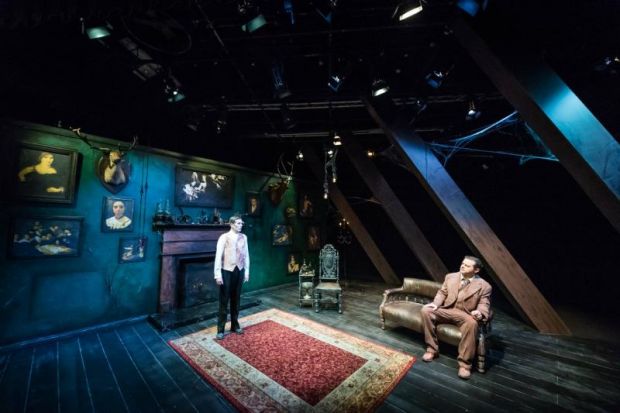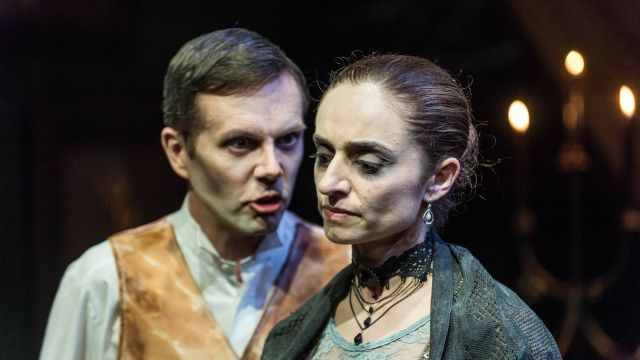The Fall of the House of Usher
Cobwebs hang from heavy rafters pushing down on a mysterious, dark room. Grim family portraits stare from a murky green wall. Wisps of smoke trail over worn, dusty furniture. An atmosphere of bleakness hovers and invades …
Thus has director Paul Sztelma set the scene for this carefully crafted adaptation of Edgar Allen Poe’s grisly story of a family steeped in intrigue and depravity – a tale one would not consider easily transferred to the stage. But Jack Neary has cleverly transposed it into a macabre thriller that works disturbingly well – especially when directed with the precise timing and perceptive characterisation that has been achieved in this production.

The play begins with New York detective Michael Shauhgnessy interrogating James Brookfield who has been visiting his one-time friend, Roderick Usher. Through Brookfield and Usher’s maid, Fiona, Shaughnessy unravels the strange and disturbing events that have culminated in a raging fire … and two charred bodies. As his interrogation proceeds, the sickening shame of the House of Usher is played out.
Gavin Jamieson is scarily gruesome as the depraved Roderick. Thin and ramrod straight he sustains frightening authority. Always alert, with every word and gesture rigidly controlled, he deftly exploits those around him. This is a loathsome character and Jamieson plays him with spine-chilling clarity.
Ricarda Emanuel plays his wraithlike twin sister, Madeline whose fading beauty and diminishing strength Emanuel captures hauntingly in vacant eyes and submissive reactions. A weary marionette, she responds with numbing apathy to her brother’s manipulation – and the pernicious ministrations of his ‘tame’ medico, the groveling Dr Tremblay played with servile obsequiousness and quivering distress by Todd Beilby
Less under Roderick’s spell is his only remaining servant, Fiona. Christine Wilson plays this role with saucy spirit, whether responding to the cold instructions of her master – or the probing questions of Shaughnessy. Her high pitched, cheeky responses bring a little relieving lightness to the dark tale that is unfolding.
 As Brookfield, Ben Freeman becomes increasingly tormented as he recreates the distasteful scenes he has witnessed and the horrendous implications behind them. Moving in and out of past and present, he captures the gamut of emotions that Brookfield has experienced: concern, distaste, horror, revulsion, fear … all are there in his anguished expressions and increasing distress.
As Brookfield, Ben Freeman becomes increasingly tormented as he recreates the distasteful scenes he has witnessed and the horrendous implications behind them. Moving in and out of past and present, he captures the gamut of emotions that Brookfield has experienced: concern, distaste, horror, revulsion, fear … all are there in his anguished expressions and increasing distress.
Tying every scene together, is the relentless Shaughnessy played by Stephen Snars. Thoughtful and incisive, Snars is the consummate detective, pushing Brookfield to relive his horror, teasing information from the maid – and becoming progressively sickened by the horror they eventually reveal.
There is a sinister, anticlimactic twist to this story that both Neary and Sztelma contrive to keep from the audience – and far be it from me to give their game away. Suffice to say that this is a spine tingling production that uses all the elements of the thriller – disquieting characters, a carefully constructed plot, a spectral set and eerie lighting (James Winters) – all presided over by a creative, insightful director who has the courage to try something different – and make it work.
Carol Wimmer
Photographer: Chris Lundie.

Subscribe to our E-Newsletter, buy our latest print edition or find a Performing Arts book at Book Nook.

